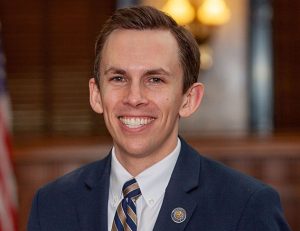
When Paul Martin, a UM anthropology graduate, began working on a cold case in his undergraduate years, passion was what he found. Through the connections he made within the cold case, he began independently researching. He now operates his own business, Martin Archaeology Consulting, where he uses cadaver dogs in archaeological digs across the southeast.
“It wasn’t just this aspect that attracted me to anthropology, it was the overarching umbrella that it provides to look at all of human activity,” he said. “It not only allowed me to look at the contemporary, through the subdiscipline of archaeology I am able to look at the historic and pre-contact activities that have occurred here in North America.”
Today, the latest in a series of reports from Mississippi State Auditor Shad White’s office has some academic degree programs like anthropology, African American studies, and women and gender studies in its crosshairs.
The report, entitled “Plugging the Brain Drain: Investing in College Majors That Actually Work,” proposes using an outcome-based approach to allotting state appropriations for degrees and programs at state-funded colleges and universities in Mississippi based on workforce needs.
White’s report comes in response to a 2022 report that demonstrated many students come to Mississippi to earn a collegiate degree but do not stay in the state to work. This phenomenon, in which educated and/or professional individuals leave one location for another, is called brain drain.
“In April 2022, the Mississippi Office of the State Auditor released a report showing nearly half of Mississippi’s recent college graduates no longer work in the state soon after completing an undergraduate degree,” White said. “That report also showed Mississippi’s worsening brain drain problem has become a significant burden to taxpayers and a real threat to our state’s economy.”
The report singles out majors like rhetoric and composition, anthropology and drama as earning the least income in Mississippi three years post-graduation. It cited engineering programs and health professions as earning the most in Mississippi within the same time frame.
In the days leading up to the release of his report, White made numerous posts on X, formerly Twitter, in which he spoke about the misuse of taxpayer money to fund these programs and blamed these “garbage fields” for the student debt crisis.
“Degrees in garbage fields are terrible for students. Kids graduate with debt they can’t repay. It’s the reason U.S. student debt has doubled in the last 20 years,” White said. “Degrees in garbage fields are also bad for the economy. They produce graduates who offer no real skills.”
White’s posts, as well as his report, have received backlash from students, graduates and others across the state. Senior international studies major Wake Monroe believes that White’s report was misguided and motivated by partisan politics, without the interests of Mississippians at heart.
“I firmly disagree with the auditor’s comments. I believe that he has equivocated economic output with overall value that a major gives its student. While I am always ready to hear new proposals for improving Mississippi, a place I have called home my whole life, I think his statement is misguided,” Monroe said. “Furthermore, I believe if he released this report in good faith, genuinely trying to guide Mississippians to a better future, he would not have used such flagrant language, attacked caricatures of majors instead of using an argument of substance and would have avoided tired political rhetoric.”
Monroe is minoring in Spanish, biology and anthropology. He is applying to medical schools while finishing his senior year and intends to use all of his minors in his further education, as well as in his career.
“Studying different languages, understanding people and gaining the necessary skills to be a great doctor are not found in biology textbooks,” Monroe said.
White proposes that the Mississippi Legislature follow the lead of Texas Gov. Greg Abbott. Texas’ House Bill 8 reroutes state funds toward degrees that proponents hoped would bolster the state’s economy. In Texas, community colleges receive additional funds for producing graduates in specific degree programs, often STEM related, and less money for each student in a liberal arts degree program.
In the 2022-2023 academic year, there were 24 students at UM majoring in anthropology, of which archaeology is a subset. Martin sees anthropology as an interdisciplinary discipline where scientific study of human behavior, culture and biology intersect.
“I equate anthropology to an interdisciplinary discipline depending upon your focus or research interest because we can and do work with so many different techniques and technologies. We also get to engage with the environment around us, and more importantly we get to help tell the story,” Martin said.
Caitlin Stewart is an Ole Miss archaeology graduate, and she pursued her master’s degree in the field as well. Stewart has been employed in archaeology for 16 years — including a job in the state of Mississippi.
“While in graduate school I worked as an archaeologist for the Holly Springs National Forest in Oxford. In addition to these jobs, there are many jobs in archaeology in the state, federal and private sectors,” Stewart said.
More people are pursuing college degrees today than ever before, and many fear that limiting their scopes of study could deter future undecided students. Monroe thinks that is too high a price to pay.
“I view his report as an attempt at garnering political attention, wasting Mississippians’ resources, doing a disservice to his office and giving yet another example of weak and broken politics,” Monroe said. “I would be genuinely surprised if (White) does not run for some kind of higher office soon and use this as a starting point. At the end of the day, Shad White misused his office to create political discord, wasted Mississippians’ resources and created arguments that oversimplify the value of education.”
Ashlynn Payne contributed reporting.



























